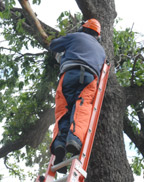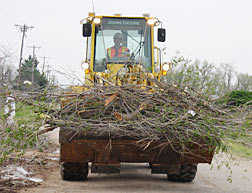Posted: 5/02/07
BaptistWay Bible Series for May 13
Inviting all kinds of people to know Christ
• Acts 16:13-15, 25-34
By Leroy Fenton
Baptist Standard, Dallas
Leadership is crucial and necessary to the body of Christ. Opening doors to other cultures is the work of the bold and courageous. Leaders filled with the Holy Spirit willing to place their lives on the line stand out in a crowd.
The letter from the church in Jerusalem to the church in Antioch, following the settlement of the question of salvation for all by grace through faith, speaks of “our dear friends Barnabas and Paul—men who have risked their lives for the name of our Lord Jesus Christ” (15:25-26).
Cultures are different socially, spiritually, economically, morally, racially, educationally and a thousand other ways. Penetrating and merging cultures are daunting tasks.
Change is embraced with reluctance and suspicion. Spiritual advance can be explosive, disruptive, misunderstood and fearful. Changing perception is difficult on both national and personal levels. Cultures clash with tornado-like force, producing conflict and war. Missionaries face constant risk, rejection, rebuke and resistance, but also reward.
Luke notes the change of leadership, when the messengers from Jerusalem returned home, by changing the name order: “Paul and Barnabas remained in Antioch where they and many others taught and preached the word of the Lord” (15:33-35). Luke acknowledges leadership development in that “many others taught and preached….” A growing number of leaders were being mentored and trained and assuming strategic places of leadership.
I find this fascinating when I think of the hours utilized by the church seeking or waiting for people to assume the most insignificant leadership roles. It seems the New Testament, Holy Spirit-inspired church had the necessary people to push the gospel from the cradle to the nook-and-crannies of the unmarked paths of the world. Christianity was on fire and mobile, creating new structures that worked, finding its groove among the peoples of the world and settling for nothing less than success.
Paul has rested and recovered. His heart and mind are turned again to his task. Having birthed new congregations and established new beachheads, Paul wants to return to see how this new faith is faring and to lend his encouragement should they waver (15:36).
The second missionary journey of Paul began with a serious confrontation. Having a “sharp disagreement” with Barnabas over John Mark, Barnabas and Paul split up. Paul took Silas, a leader in the Jerusalem fellowship, and went “through Syria and Cilicia.” Barnabas took John Mark and went to Cyprus (15:36-41).
At Lystra, Timothy joins Paul and Silas. The strong, profound and clear leadership of the Holy Spirit influenced every decision, preventing them from going into Asia and Bythinia. Paul’s struggle to find the will of God gives us all some consolation. Finding and knowing the will of God can be difficult.
In Paul’s aggressiveness, God had to redirect his energy. God, in his wisdom, saw an open door that would lead to more significant consequences. Paul somehow knew the other doors were closed. Consequently, they found themselves in Troas, near the location of the ancient city of Troy.
Like Peter on the roof top (Acts 10), who saw the vision of the clean and unclean animals and heard the voice of God leading him to Cornelius, Paul saw the vision of a man begging him to “come over to Macedonia and help us” (Acts 16:1-10). Luke reports that “we got ready at once” (v. 10), indicating that he had personally joined the journey. His account of this part of Paul’s missionary history would be as an eye-witness.
Paul was sure and certain of God’s guidance. Certainty in the visionary summon brought immediate response. There is a great lesson to be learned that immediate obedience can bring emphatic results. Crossing the Aegean Sea, some 20 years after Pentecost, the missionaries go eight miles inland from Neapolis to Philippi, the leading city of Macedonia (vv. 11-12), a Roman province. Paul, a Roman citizen, driven onward by the Spirit who empowered his passion, found himself drawing nearer to Rome.
An Open Heart (Acts 16:13-15)
After several days of rest in Philippi, on the Sabbath, Paul and the others sought a place of prayer. There were so few Hebrew worshippers there was no synagogue. When there was no synagogue, Hebrew people would gather near the river for prayer. He found only a few women by the river and he engaged them in conversation and then shared with them the resurrected Christ (v. 13).
Lydia, from Thyatira, listened carefully and became a believer, the first convert in Europe. The first convert was not a man (v. 9) and was not a native Macedonian, but a woman from Asia Minor, simply referred to as “a worshiper of God” (v. 14). She could have been Jewish or a Gentile proselyte to the Jewish faith.
Lydia was possibly so named because Thyatira was a Lydian city. A business woman who sold purple cloth, Lydia is considered reasonably wealthy because of the capital needed to engage in this enterprise. “The Lord opened her heart to respond to Paul’s message” (v. 14), and members of her household were baptized as well (v. 15).
Please note again that “The Lord opened her heart … .” The work of the Holy Spirit is to send someone to witness and to open the sinner’s heart. When she responded in faith, she also opened her home to Paul, allowing him the opportunity to give his full attention to preaching and teaching. Lydia was persuasive in her invitation. Paul has a base from which to work to bring his saving message to Europe. From this tiny church, Paul stepped eagerly into a bigger world. Lydia’s home was a beginning for the European campaign.
Paul, as a Pharisee, is assumed to have prayed the prayer, “I thank God that I am not a Gentile, slave nor a woman.” His experience with Christ and passion for his mission brought him to a more enlightened position where he would declare: “You are all sons of God through faith in Christ Jesus … . There is neither … male nor female, for you are all one in Christ Jesus” (Galatians 3:26-28).
The baptism of a woman, the first in Europe, is a preview of the future of things to come. This was a cosmopolitan experience. God’s Spirit could work in an outdoor sanctuary, in a barbaric community, in the heart of a traveling saleswoman whose home was hundreds of miles away. Paul, a Jew, born as a Roman, essentially homeless, stood on European soil, in a Roman province, to lead a wealthy business woman from Asia Minor to a profound saving faith in Christ Jesus. Only the Holy Spirit could prompt Paul to preach and open the heart of Lydia. Nothing is more noble or more necessary.
As you go, make disciples. Every culture of the world can be breached when God’s message is preached and empowered. Keep in mind, Paul had been rejected many times, and had he not kept on preaching, the door to Europe would not have been opened. The seed has to be planted if there is to be a harvest.
An open jail (Acts 16:25-34)
The diversity may be coincidental to the purpose of this chapter, but note the power of God in the life of an aristocratic woman, a demon-inspired slave girl and a Roman jailer.
Through a series of events brought about by the harassment of a deranged slave girl, Paul and Silas found their first conflict and rejection in European territory. The spirit of the slave girl was to mock the message of salvation preached by Paul and Silas. When Paul cast out her deceptive, captive spirit, the slave girl’s owners, motivated by greed, created an uproar, dragging Paul and Silas before the magistrates with bogus charges. The magistrates had them beaten and thrown into the inner prison with their feet locked in stocks (vv. 16-24).
What a gargantuan turn of events to go from the warm hospitality of Lydia’s home to biligerant rejection by government officials and community for a dungeon cell. Evangelism can bring about persecution.
The outcome, however, was awesome. One of the best-loved and -known stories in Acts is the conversion of the Philippian jailer. The beaten and imprisoned missionaries began to pray and sing hymns to God about midnight (v. 25). Honoring God in desperate times makes the most unholy take note.
The other prisoners were listening when a violent earthquake shook the foundations and the displaced walls released the prison doors and the chains that bound the prisoners fell off (v. 26). Earthquakes were somewhat common in that area, but the timing was miraculous.
The inattentive jailer was jostled awake by the movement of the earth. His fears also were awakened. Assuming the prisoners were free, he reached for his sword to take his life, knowing he could be held responsible by his superiors. Paul’s voice to stop stayed the sword.
Trembling before Paul and Silas, the jailer asked the question of the ages, “What must I do to be saved?” (v. 30). Every catastrophe brings about opportunity for God’s spirit to work.
It is impossible to tell what the jailer had in his mind. My thoughts are these. He had listened to the testimony of Paul and Silas as they sang hymns and praised God, but had dropped off to sleep from weariness of many nights of work. Fear of loss of life from the earthquake and from his superiors brought him face to face with the emptiness of his soul and spirit.
His question was a quest for what Paul and Silas had—joy in times of danger, fearless in the face of their capturers, contentment in prison and security in the depth of the soul. The testimony of their attitude and demeanor brought this pagan man to his knees in faith. The missionaries planted the seed, and God opened the heart through the circumstances of a jail blown open by an unexpected volcano.
How simple the answer: “Believe in the Lord Jesus, and you will be saved—you and your household” (v. 31). After further explanation of the message of the resurrected Christ, the jailer “washed their wounds” and “he and all his family were baptized” (v. 33).
Notice how his changed life changed his hospitality. Like Lydia, the jailer brought the missionaries into his home, fed them and expressed his joy in his new life in Christ. Now he had what Paul and Silas had and was overjoyed from the inside out.
Summary
The Holy Spirit brought faith in Christ to a “worshipper of God” and to a pagan jailer. God can touch the life of the smallest and largest, poorest and richest, worst and the best, in any circumstance or situation, in a worship service or in an earthquake, to the tender heart of a woman or the fearful heart of a man. The gospel is for the world.
Discussion question
• To what extent does your church act on the recognition that the message of Christ is good news for all kinds of people?
News of religion, faith, missions, Bible study and Christian ministry among Baptist churches, in Texas, the BGCT, the nation and around the world.




